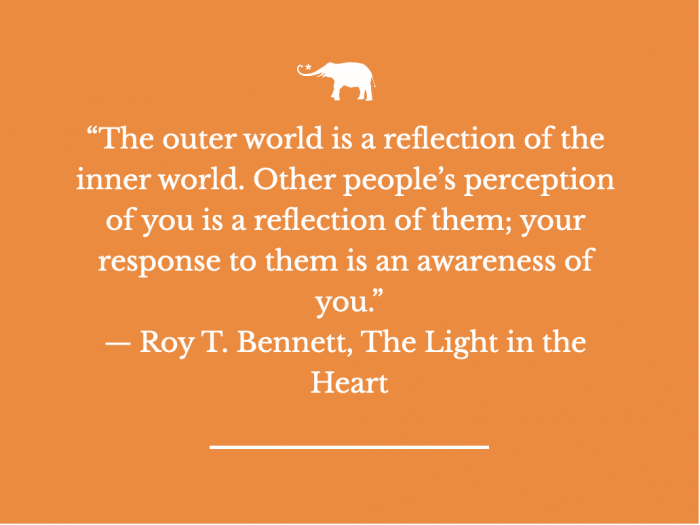Someone I was close to once said to me, “I know you better than anyone.”
It felt like he’d punched me in the gut.
For years prior to this moment, he’d taken many opportunities to demean me, tell me I was crazy or an idiot, incapable or uneducated, and that my ideas were foolish. So when he said he knew me better than anyone, I felt my soul crack.
Luckily, my soul has a lot more inside it than that outer shell he damaged, and I wasn’t about to believe that who he knew was who I am.
The actual truth was that he was viewing me through the heavy weight of his own perceptions, which had been formed based on a life experience vastly different from my own.
Many of us move through life expecting others to see the world as we do. We expect them to respond to us in the way that we would respond to ourselves, and we may feel shocked when they don’t. This can create conflict.
When people perceive something differently from one another, it is easy for disharmony to occur.
So much of life’s interactions revolve around perception.
A quick online search of the word gave me these definitions:
“Perception: noun
the ability to see, hear, or become aware of something through the senses.
‘the normal limits to human perception’
the state of being or process of becoming aware of something through the senses.
‘the perception of pain’
a way of regarding, understanding, or interpreting something; a mental impression.”
For the purpose of this article, let’s focus on the third definition, “a way of regarding, understanding, or interpreting something; a mental impression.”
From birth, we are noticing. We are perceiving. We are making mental impressions. So much of the way we see the world has to do with things we notice and how we see them.
We come into the world our own being, unique, and already fully ourselves. When we arrive, we haven’t begun to wear the world. Like layers of fabric, over time, the world covers us. Now, we aren’t that pure being that first came here. Now we are wearing many layers from the many experiences that have inserted themselves into our lives, and thus onto us.
When we connect with others, we do so while bearing the cumbersome weight of all of these layers.
In all human relationships, we have choices. We have choices about what we say, how we say it, and how we respond to others. Each interaction with another human being is an opportunity. It is an opportunity to build someone up, or break them down. It is an opportunity to allow harmony or disharmony.
So much of this begins with perception.
There was a student during my middle school years who wanted to fight me. I was kind of shy and didn’t realize there was anything wrong between the two of us, until one day in Home Economics when she came up to me and told me she wanted to fight me. I told her I didn’t want to fight her, and when she asked why, I said it was because I wasn’t mad at her. I went back to whatever I was doing in class, and she didn’t pursue it.
To this day, I still don’t know why she wanted to fight me. Our paths crossed many times over the years, but we never did fight. She always regarded me with a small sneer, and I quietly kept my distance. Things could have gone differently. Maybe I could have asked why she wanted to fight me. Maybe I’d have learned something about some subtle signal I was putting out that I was unaware of. Maybe I could have gotten mad because she wanted to fight and things would have escalated. Who really knows. Sometimes I’d like to find her and ask her, but most of the time, I’m happy to let that question go unanswered.
When we interact with others who experience life differently, it is easy to jump to the immediate conclusion that the person we are engaged with has negative intentions. Instead, we can take an extra moment to wait, breathe, pause, and receive the other person with compassion and curiosity. This extra time can give us the space to see through our layers, to allow for a more open and clear space for communication.
Each person we meet is a mirror. When we see the worst in others, we also see the worst in ourselves. If we tend to look at others as if they are out to get us, we are creating a sense of distrust in the world that goes back to us, and we lose faith in ourselves.
If we are able to look into the world with open eyes that are willing to look for the good in another, we are more able to see the good within ourselves. We don’t want to blindly expect others to treat us well. We must be aware when others are not acting with kind intentions, but we can allow ourselves to anticipate harmony first.
I offer an invitation—an invitation to take some time to practice entering into each human connection with the expectation that the other person has positive intentions.
Remember all of those heavy layers that you both carry. Remember that under your layers, and under theirs, we are each a vibrant and unique being. Begin the interaction with a positive expectation. If the situation doesn’t feel safe, step back, trust your instincts. Otherwise, give people a chance, especially those closest to you.
During these moments, I invite you to slow down, pause, really try to hear them, perhaps ask for clarification if you initially perceive something negatively. You may be warmly surprised by what you learn.


 Share on bsky
Share on bsky





Read 0 comments and reply